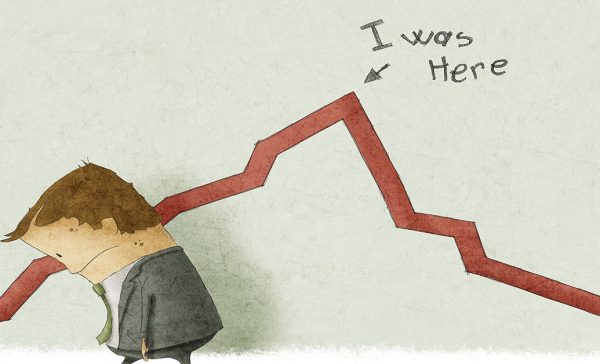7 Common Investor Mistakes and How to Avoid Them
Avoiding common investor mistakes is as important, if not more so, than making good investment decisions. Learn some of the most common mistakes that could be jeopardizing your retirement.
Investor Mistake #1: Trading on Emotion and Lack of Restraint
We are understandably emotional about our investments. The tendency to let our emotions get the best of us is the #1 mistake made in investing. Here are only a few of the mistakes that can be made when we trade on emotion and lack of restraint.
Buying on Unfounded Tips
Unfounded tips come from many sources,—friends, family, TV “experts”, bloggers, financial newspapers & magazines, etc. These tips may speak of the “next big IPO”, the little-known “undervalued gem”, or a groundbreaking new product about to be released. The all have one thing in common,—they quickly stir up our emotions.
This isn’t to say that you should balk at every investment tip. A more appropriate response to the tip is to use it as a starting point to begin proper research not only into the truthfulness of the tip itself, but how buying or selling this asset suits your personal goals, asset-allocations, diversification and overall investment strategy.
Holding Onto Failed Investments Due to Pride and Denial
We are all human and prone to mistakes. Unfortunately, some investors choose to hide in denial of investment mistakes rather than to face the simple truth that a mistake was made. It could be that a once long-time winner has taken a turn for the worse and you failed to “sell at the top”. It could be that a purchase of a promising investment failed out of the gate.
Remember, past performance is no guarantee of future performance. A fresh, unemotional, look at every investment you hold must be made periodically and trading decisions made accordingly.
Absence of Patience and Self-Control
Successful investing, as a whole, works best with long-term horizons. Frequent emotional trading, whether out of panic or euphoria, produces more harm than benefit over the long-term. Frequent trading, attempting to “time the market” and other similar behavior isn’t investing, it’s speculation. It’s gambling with your life savings.
True investing relies on contributing regular amounts at regular intervals, in both rising and falling markets, to a thoroughly researched, diversified portfolio customized to your needs. Real investors give their assets a chance to perform over years, not days or weeks, adjusting allocations at regular intervals.
Investor Mistake #2: Investing Without Planning
Do you have a personal investment plan that addresses the following?:
Goals and objectives – These are very personal and serve as the map to your investment strategy. At what age do you hope to retire and with what monthly income? Do you have children to put through college? Do you have aging parents to support? Do you plan to own a home or start a new business?
Risks – How much risk can you tolerate? How much risk is necessary to earn the yields required to meet your financial goals and objectives? How big is the gap between your risk tolerance and risk necessity? Do you have a risk-mitigation strategy in place?
Asset allocation – What percentage of your investment portfolio will you allocate to U.S. equities, international stocks, U.S. bonds, high-yield bonds, etc.? Asset allocation is an integral part of responsible investing. Allocations will also change over time, as you age and with changes to your goals and objectives.
Diversification – Allocating to different asset classes is the initial layer of diversification. You then must diversify further within each asset class. In U.S. equities, for example, this could mean varied exposure to large, mid and/or small cap sectors. It could mean varied exposure to industry-based sectors, such as technology, health care and/or consumer staples.
When you have a written, well-conceived investment plan (often derived from a comprehensive financial plan), you’re more able to adhere to a sound long-term investment strategy, even when current market conditions are unsettling. Having a good plan and sticking to it is not nearly as exciting as trying to time the markets, but it will likely be more profitable in the long-term.
Investor Mistake #3: Chasing Past Performance
Investors often select asset classes, managers, stocks/bonds and funds based on recent strong performance. Today, we all have access to investment tools that give us incredibly granular insight into past performance. The feeling of missing out on great returns has led to more than a few bad investment decisions over time.
Unfortunately, the particular cycle that led to this great performance may be nearing its end. The smart money is moving out, and the not-so-smart money is pouring in.
Future performance will likely be different from historical performance, as the current investment environment will have changed from the prior environment.
In short, don’t make the mistake of basing your investment plan on historical performances. If investing was that simple, then more people would be successful at it!
Investor Mistake #4: Trading Without Adequate Knowledge & Skills
Most people in the very early stages of wealth building begin trading on their own without adequate knowledge and skills. It’s as understandable as it is unfortunate. However, many continue to manage their own investments well beyond the point of when they can benefit from the services of a qualified investment advisor. This can be akin to representing oneself in court without an attorney, or filing a complex corporate tax return without the aid of a tax accountant.
Note that these mistakes aren’t limited to those who make their own investment decisions. They equally extend to unskilled and inexperienced stock brokers and financial advisors.
Here’s a short list of some of the mistakes made by those who trade without adequate knowledge and skills:
- Overestimating your abilities.
- Inadequate diversification.
- Inadequate asset allocation.
- Getting trapped in low-liquidity investments.
- Focusing on the wrong performance metrics.
- Forgetting to factor for inflation.
- Failure to consider tax implications.
- Failure to begin with a comprehensive financial plan.
Investor Mistake #5: Trading Based on Financial Media Hype
The hosts of financial media news shows are not hired for their investment savvy. They are hired because they are engaging entertainers with the ability to stir up your emotions and to bring you back day after day.
The financial media simply knows that hype and fear attract viewers and readers. Their underlying motivation is to maximize subscription and advertising revenue, thus biasing editorial policy toward sizzle that sells rather than substance that serves. The bottom line is your investment advice is coming from sources whose business objectives are focused on their wealth, not yours.
Now compare the above to that of having a personal relationship with an experienced financial advisor who has a fiduciary responsibility to always act in your best interest, one who’s primary motivation is to customize your investment strategy to serve your financial and retirement goals. There’s simply no comparison.
Investor Mistake #6: Attempting to “Time the Markets”
Few things can destroy one’s retirement portfolio faster than attempting to “time the markets”. This applies to novice investors as well as seasoned professionals. Attempting to time the markets is not investing, it’s speculation, and speculation is a form of gambling. Don’t gamble with your life savings!
It is simply impossible to know when the market has peaked or when it’s at the bottom of a decline. Further, chasing that kind of market timing is going to incur excessive transaction fees and demand a lot of your time.
Focus instead on the proven investment strategies that employ appropriate diversification, asset-allocation, and, most importantly, long-term investment horizons.
Investor Mistake #7: Working with the Wrong Advisor or Without an Advisor
Those who meet the minimum asset requirements necessary to engage a competent financial advisor and yet choose to do their own investing are at a high risk to make all of the above investment mistakes, so we won’t go through them again here. In fact, one of the greatest benefits from engaging an investment advisor is simply to protect ourselves from investment mistakes made when we do our own trading.
Yet even for those who engage an advisor, another potential mistake looms,—that of choosing the wrong advisor.
Unfortunately, there is little regulation over whom may call themselves a “financial advisor” or “financial planner”. One must investigate much deeper so as to avoid the mistake of choosing an unqualified advisor. We have provided a number of articles to help you find the best financial advisor for you and your family:
- How To Find A Financial Advisor
- The Advantages of a Fee-Only Financial Advisor
- The Risk and Disadvantages of Large Brokerage Firms
- Why RIAs Make the Best Financial Advisors
How to Reduce the Risk of Investment Mistakes
Most of our new clients are hiring a financial advisor for the first time due to, unfortunately, having made one or more serious investment mistakes on their own. We strongly encourage those with investable assets in the low six-figures and above to preemptively engage a competent financial advisor as early as possible.
Most financial advisors and planners will offer a free, no-obligation consultation to create an opportunity for you to get to know them, and vice-versa. You can learn about their qualifications, investing philosophy, fee structure and the services that may be included in their service package. Our clients are always pleasantly surprised to learn of the many benefits they receive above and beyond our investment advisory services.
A good advisor will ask a lot of questions about you and your family, your work and professional aspirations, and your financial and retirement goals. He or she will take a sincere interest in your life.
We encourage you to accept our offer of a free financial planning and retirement planning consultation.
Do You Have Important
FINANCIAL QUESTIONS?
Accept our offer of a free
Financial Planning Checkup
 Todd E. Frank, CPA/PFS, MBA is the President and CEO of Frank Financial Advisors, a Registered Investment Advisory Firm (RIA) serving clients nationwide from our headquarters in Carlsbad, San Diego, California. As an RIA, Frank Financial Advisors is able to offer truly independent, fee-only financial advisory services.
Todd E. Frank, CPA/PFS, MBA is the President and CEO of Frank Financial Advisors, a Registered Investment Advisory Firm (RIA) serving clients nationwide from our headquarters in Carlsbad, San Diego, California. As an RIA, Frank Financial Advisors is able to offer truly independent, fee-only financial advisory services.


